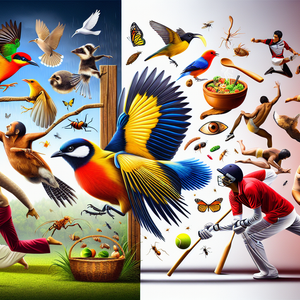From Teenagers to Stars: The Unseen Influence of TV on Musical Aspirations

'American Bandstand' debuted in 1952 and quickly became a cultural phenomenon, capturing the attention of millions of viewers across the United States. The show featured live performances by aspiring musicians, providing them with a national stage that had previously been inaccessible to many. For countless young artists, the opportunity to perform on 'American Bandstand' was more than just a chance to showcase their music; it was an opportunity for visibility and validation in an industry that could often seem daunting. Consider the story of a teenage Elvis Presley, whose memorable performance on the show catapulted him from a regional sensation to a national icon. The exposure he received on 'American Bandstand' was instrumental in cementing his legacy as the 'King of Rock and Roll.' Similarly, artists like Chubby Checker leveraged the platform to elevate their careers, with his rendition of 'The Twist' sparking a nationwide dance craze that would go on to define an era. Moreover, 'American Bandstand' emphasized the importance of youth culture within the music industry. The show's format included teenagers dancing and engaging with performances, creating a vibrant atmosphere that resonated deeply with its audience. This representation was significant for aspiring musicians who longed to see themselves reflected on screen, further fueling their ambitions to succeed in the music business.
Personal Stories of Inspiration
Numerous musicians have openly discussed the profound impact that 'American Bandstand' had on their careers. For instance, the legendary singer-songwriter Barry Manilow has recounted how watching the show ignited his desire to become a performer. He reminisced about the electrifying acts he witnessed, including The Supremes and The Beach Boys, which inspired him to carve out his own path in the music world. Similarly, pop icon Madonna acknowledged how television music shows like 'American Bandstand' influenced her understanding of performance and showmanship. She credits the show for shaping her approach to music and entertainment, highlighting its significance in her journey to stardom. These personal anecdotes serve as compelling evidence that television programming not only showcased talent but also fostered ambition among young viewers, encouraging them to believe that they too could achieve greatness in the music industry.
A Cultural Phenomenon
The influence of 'American Bandstand' extended beyond individual artists; it played a pivotal role in shaping the cultural landscape of the time. The show introduced new musical styles and trends, from rock and roll to rhythm and blues, while helping to democratize music consumption. Young viewers were exposed to a diverse array of genres, fostering a sense of musical curiosity and experimentation that was emblematic of a generation eager to break free from traditional norms. Additionally, 'American Bandstand' was instrumental in breaking down racial barriers during an era marked by segregation. By featuring African American artists alongside their white counterparts, the show contributed to the integration of music and culture, making a lasting impact on societal norms. This representation was crucial in promoting inclusivity within the music industry, inspiring young musicians from all backgrounds to pursue their passions and dreams.
The legacy of 'American Bandstand' is not merely one of entertainment; it is a testament to the power of television in shaping musical aspirations and cultural identity. The stories of artists who credit the show with launching their careers underscore its significance as a platform for young talent. In a time when avenues for exposure were limited, 'American Bandstand' served as a beacon of hope and inspiration for countless aspiring musicians. As we reflect on the past, it is essential to acknowledge how these televised moments not only entertained but also empowered a generation to dream big and reach for the stars. In understanding the relationship between television and music, we can appreciate the profound influence these shows had on the trajectory of countless careers, ultimately shaping the soundscape of modern music.
Music Talent Manager
Talent management agencies, record labels, and entertainment firms
Core Responsibilities
Identify and nurture emerging musical talent, providing guidance on career development and branding.
Negotiate contracts and manage business relationships with record labels, agents, and promoters.
Organize promotional events and appearances to showcase clients' music and elevate their public profiles.
Required Skills
Strong networking abilities and industry knowledge to understand market trends and opportunities.
Excellent communication and negotiation skills to advocate for clients effectively.
Experience in marketing, public relations, or a related field is highly beneficial.
Music Video Director
Production companies, independent filmmakers, and artist management groups
Core Responsibilities
Conceptualize and execute creative music video projects that align with the artist's vision and branding.
Collaborate with musicians, producers, and choreographers to develop visually compelling narratives.
Oversee the production process, including budgeting, scheduling, and post-production editing.
Required Skills
Proficiency in video editing software and a solid understanding of cinematography techniques.
Strong artistic vision and storytelling capabilities to convey themes through visual media.
Previous experience directing or producing music videos or short films is advantageous.
Music Marketing Specialist
Record labels, music festivals, and online music platforms
Core Responsibilities
Develop and implement marketing strategies to promote new music releases and events.
Analyze market trends and audience demographics to tailor campaigns effectively.
Collaborate with social media teams to create engaging content that resonates with target audiences.
Required Skills
Expertise in digital marketing tools and platforms, including social media and email marketing.
Strong analytical skills to measure campaign effectiveness and adjust strategies accordingly.
A background in music or entertainment marketing is preferred.
Music Journalist
Music magazines, online publications, and entertainment blogs
Core Responsibilities
Research and write articles, reviews, and interviews about musicians, albums, and industry trends.
Attend concerts, festivals, and events to cover live performances and engage with artists.
Build a network of contacts within the music industry to source stories and gain insights.
Required Skills
Exceptional writing and editing skills, with a keen ear for musical analysis and commentary.
Strong knowledge of music history and current trends, particularly in genres relevant to the publication.
Ability to work under tight deadlines and manage multiple assignments simultaneously.
Sound Engineer
Recording studios, live event production companies, and music venues
Core Responsibilities
Set up and operate audio equipment during recording sessions and live performances.
Mix and edit audio tracks to achieve the desired sound quality and artistic vision.
Collaborate with artists and producers to understand their sound preferences and project goals.
Required Skills
Proficiency in audio production software and equipment, such as Pro Tools and mixing consoles.
Strong technical knowledge of acoustics and sound design principles.
Experience in a studio environment or live sound settings is essential.


